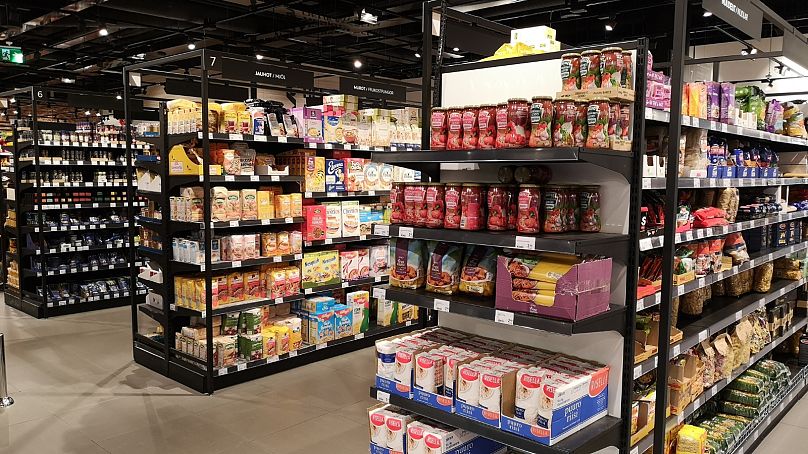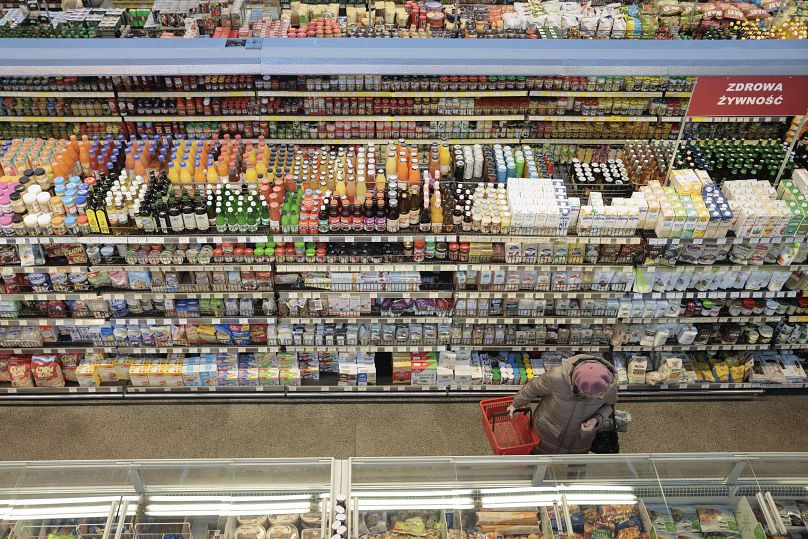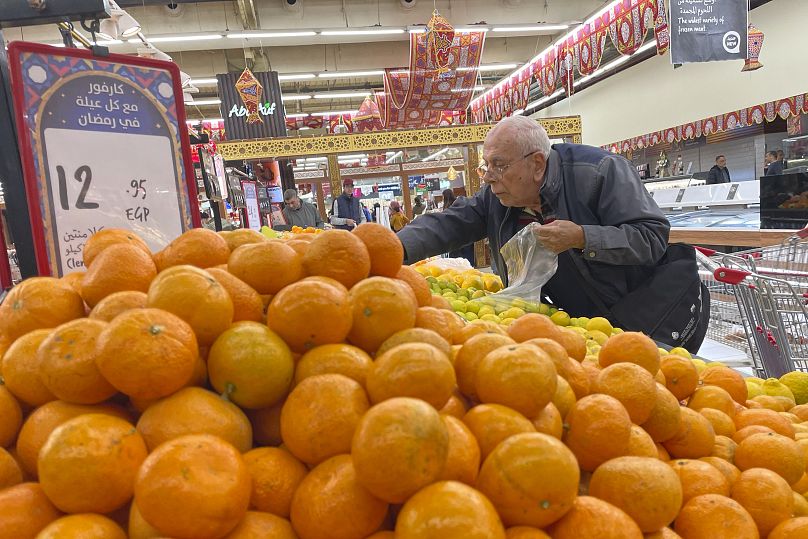In the past few years, the world has experienced the rise of food billionaires - companies profiting from skyrocketing prices and making huge revenues while many are forced to cut back or go hungry.
In the past few years, the world has experienced the rise of food billionaires - companies profiting from skyrocketing prices and making huge revenues while many are forced to cut back or go hungry.
Just like in the energy sector, food companies have been cashing in from the cost of living crisis that has followed the difficult times of the COVID-19 pandemic. But while companies like Shell and Exxon are almost household names, the names of the businesses pulling the strings of the food industry - Cargill and Walmart, among others - are less well-known, and much less scrutinised.
“It’s surprising in a way, because I think that they’re doing exactly the same thing as the fossil fuel corporations,” Nick Dearden, director of NGO Global Justice Now, told Euronews. “You’ve got a bunch of corporations that are growing more and more and more powerful all the time, gaining more control over different aspects of the food system and massively profiteering.
“And during a cost of living crisis, where many people are struggling to afford heating and food, they are making an absolute fortune and they’re doing it in the same way as the energy corporations. Essentially, they are monopolising a very basic thing that we all need.”
While the supply of food keeps increasing on a global level, even despite the setback caused by Russia’s invasion of Ukraine and the war that has followed, and would be “more than enough to feed everybody in the world, the number of people who are chronically malnourished is going up,” Dearden said.
“There’s something really rotten at the heart of the system that allows people to go seriously hungry, to be malnourished, and in the worst cases to starve, while we have enough food.”
In a recent report on the issue, ETC researchers Hope Shand, Kathy Jo Wetter, and Kavya Chowdhry called the biggest players in the food and agricultural industries “food barons” - a title that immediately points to the power these corporations exert on the food industry.
Where do food billionaires come from?
Food barons existed long before the pandemic, or the cost of living crisis. These are companies that have established themselves through decades and have come to control large parts of the sector. But the pandemic and the cost of living crisis have had a huge role in increasing their relevance - and their numbers.
According to a recent report by Oxfam titled “Profiting from pain”, food billionaires have seen their collective wealth grow by an estimated 45 per cent over the past two years - for a total of £328 billion added to their profits. In the same years, 62 new billionaires were created as companies inflated their profits by capitalising on the COVID pandemic and now the growing cost-of-living crisis that has forced many to cut back and even choose between eating or heating their homes.
Same as energy companies, food billionaires have seen their wealth increase by one billion dollars every two days between 2020 and 2022. This surge in profits was mostly led by the trillions of dollars national governments have injected into their economies to keep them from collapsing, which had the unwanted side effect of driving up the price of key assets, like food.
“Looking at the figures, you find that the number of corporations that controlled the wheat industry several decades ago was a relatively small number, but nowhere near as small as it is today,” Dearden said.
“But also those corporations are finding synergies with other parts of the food system that allow them to lock in their controls. So, for example, if you have a huge stake in the pesticide and chemical industry and you also have a huge stake in the seed industry controlling the seeds that farmers grow, that’s a huge synergy because you can ensure that your seeds work with your fertilisers or your chemicals and that they can only be used together and that gives you additional control of the industry.”
The ETC report “Food Barons 2022” found that 2020 “was a horrific year for food security and health – but a bonanza for Big Food and Big Ag [Agriculture].”
The researchers write that in the midst of the pandemic, “these Food Barons made the most of the converging crises in order to tighten their grip on every link in the Industrial Food Chain” undermining “the rights of peasants, smallholders, fishers and pastoralists to produce food for their own communities and many others.”
What are the companies we call “food barons”?
ETC has identified “just four to six” dominant firms which control every aspect of the food industry, from agriculture machinery to animal pharmaceuticals. Two of these are also named by Oxfam in its report about food billionaires: the two “dynasties” of Cargill and Walmart.
Cargill is a global food giant owned by the 11th richest family in the world and one of the world’s largest private companies, though its name is not on the high street and might be unknown to most. In 2017, according to Oxfam, the company was reported among the four controlling over 70 per cent of the global market for agricultural commodities. Fluctuations in the global price of grains have led to Cargill growing its profits and the Cargill family growing its collective wealth by 65% since 2020, with four members joining Forbes list of the richest 500 people in the world.
Cargill’s competitor Louis Dreyfus Co., an agricultural trading house, also made huge profits out of the troubles with the grain market.
Walmart, the supermarket chain which is ubiquitous in the US, has received around $15 billion in cash dividends from the company, as the goods sold in their stores got more expensive and the wages of its employees stayed mostly the same.
Is the food system broken - and can it be fixed?
The problem with the way the food system works at the moment, Dearden said, is that the industry is “in a tiny number of hands and effectively controlled on the basis of how much profit those companies can make” rather than preventing people from being hungry.
“Many food corporations, because they saw that there was going to be panic around the war in Ukraine, they raised prices. They used the crisis to profiteer, essentially,” Dearden said. “And it wasn’t just the food corporations, it was also people speculating on the price of food in the financial markets. And these markets are not only privatised and monopolised, they’re also increasingly financialised as well.”
Speculation around food prices in the financial markets actually contributed to rising food prices, Dearden said.
But there’s a growing movement for creating an alternative food system.
“We work a lot with groups in the Global South, particularly in many African countries and Latin American countries, particularly Brazil and they call themselves small farmer movements.
They are working to create a different food system which actually helps the ordinary small scale farmers that still, interestingly, produce most of the world's food outside of these gigantic markets.
One way of creating an alternative food system would be to make small-scale farming a financially sustainable profession, without the constant competition of much bigger corporations.
“I think we have to convince people that if [small farming] is the kind of system that they want, if they want good quality food just grown by small producers who are reasonably local to where they are, that’s possible,” Dearden said.
“But we need to have a framework that can make that kind of business manageable, where people are not going to be on the breadline and are not going to be forced out of business by enormous supermarkets, by enormous grain producers, by the financial markets.”
Euronews has contacted Walmart and Cargill’s media team for comment.














